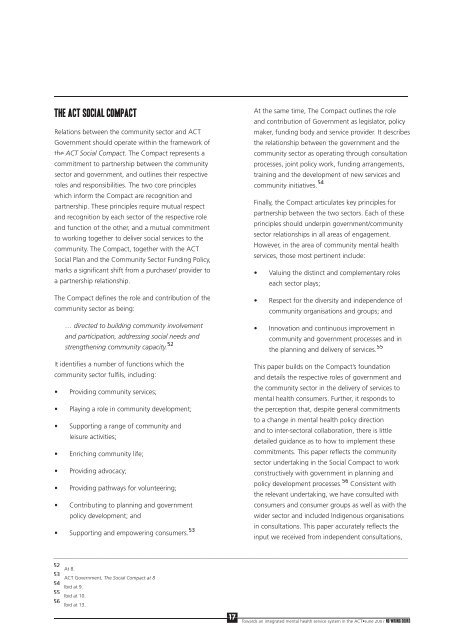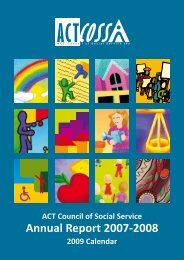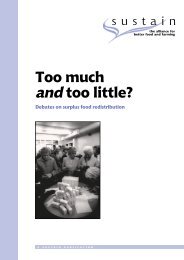actcoss text final.indd - ACT Council of Social Service
actcoss text final.indd - ACT Council of Social Service
actcoss text final.indd - ACT Council of Social Service
Create successful ePaper yourself
Turn your PDF publications into a flip-book with our unique Google optimized e-Paper software.
THE <strong>ACT</strong> SOCIAL COMP<strong>ACT</strong><br />
Relations<br />
Government<br />
the<br />
commitment<br />
sector<br />
roles<br />
which<br />
partnership.<br />
and<br />
and<br />
to<br />
community.<br />
<strong>Social</strong><br />
marks<br />
a<br />
The<br />
community<br />
It<br />
community<br />
•<br />
•<br />
•<br />
•<br />
•<br />
•<br />
•<br />
•<br />
between the community sector and <strong>ACT</strong><br />
should operate within the framework<br />
<strong>ACT</strong> <strong>Social</strong> Compact. The Compact represents<br />
to partnership between the community<br />
and government, and outlines their respective<br />
and responsibilities. The two core principles<br />
inform the Compact are recognition and<br />
These principles require mutual respect<br />
recognition by each sector <strong>of</strong> the respective<br />
function <strong>of</strong> the other, and a mutual commitment<br />
working together to deliver social services to the<br />
The Compact, together with the <strong>ACT</strong><br />
Plan and the Community Sector Funding Policy,<br />
a significant shift from a purchaser/ provider<br />
partnership relationship.<br />
Compact defines the role and contribution <strong>of</strong><br />
sector as being:<br />
… directed to building community involvement<br />
and participation, addressing social needs and<br />
strengthening community capacity. 52<br />
identifies a number <strong>of</strong> functions which the<br />
sector fulfils, including:<br />
Providing community services;<br />
Playing a role in community development;<br />
Supporting a range <strong>of</strong> community and<br />
leisure activities;<br />
Enriching community life;<br />
Providing advocacy;<br />
Providing pathways for volunteering;<br />
Contributing to planning and government<br />
policy development; and<br />
Supporting and empowering consumers. 53 At the same time, The Compact outlines the role<br />
and contribution <strong>of</strong> Government as legislator, policy<br />
maker, funding body and service provider. It describes<br />
the relationship between the government and the<br />
community sector as operating through consultation<br />
processes, joint policy work, funding arrangements,<br />
training and the development <strong>of</strong> new services and<br />
community initiatives. 54<br />
Finally, the Compact articulates key principles for<br />
partnership between the two sectors. Each <strong>of</strong> these<br />
principles should underpin government/community<br />
sector relationships in all areas <strong>of</strong> engagement.<br />
However, in the area <strong>of</strong> community mental health<br />
services, those most pertinent include:<br />
• Valuing the distinct and complementary roles<br />
each sector plays;<br />
• Respect for the diversity and independence <strong>of</strong><br />
community organisations and groups; and<br />
• Innovation and continuous improvement in<br />
community and government processes and in<br />
the planning and delivery <strong>of</strong> services. 55<br />
This paper builds on the Compact’s foundation<br />
and details the respective roles <strong>of</strong> government and<br />
the community sector in the delivery <strong>of</strong> services to<br />
mental health consumers. Further, it responds to<br />
the perception that, despite general commitments<br />
to a change in mental health policy direction<br />
and to inter-sectoral collaboration, there is little<br />
detailed guidance as to how to implement these<br />
commitments. This paper reflects the community<br />
sector undertaking in the <strong>Social</strong> Compact to work<br />
constructively with government in planning and<br />
policy development processes. 56 Consistent with<br />
the relevant undertaking, we have consulted with<br />
consumers and consumer groups as well as with the<br />
wider sector and included Indigenous organisations<br />
in consultations. This paper accurately reflects the<br />
input we received from independent consultations,<br />
<strong>of</strong><br />
a<br />
role<br />
to<br />
the<br />
___________________________________________________________________________________________________________________________<br />
52 At 8.<br />
53 <strong>ACT</strong> Government, The <strong>Social</strong> Compact at 8<br />
54 Ibid at 9.<br />
55 Ibid at 10.<br />
56 Ibid at 13.<br />
17 Towards an integrated mental health service system in the <strong>ACT</strong>•June 2007 NO WRONG DOORS













